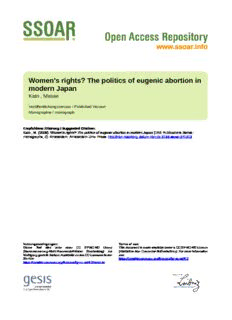
Women's rights? The politics of eugenic abortion in modern Japan PDF
Preview Women's rights? The politics of eugenic abortion in modern Japan
www.ssoar.info Women's rights? The politics of eugenic abortion in modern Japan Kato , Masae Veröffentlichungsversion / Published Version Monographie / monograph Zur Verfügung gestellt in Kooperation mit / provided in cooperation with: OAPEN (Open Access Publishing in European Networks) Empfohlene Zitierung / Suggested Citation: Kato , M. (2009). Women's rights? The politics of eugenic abortion in modern Japan. (IIAS Publications Series : monographs, 2). Amsterdam: Amsterdam Univ. Press. https://nbn-resolving.org/urn:nbn:de:0168-ssoar-271913 Nutzungsbedingungen: Terms of use: Dieser Text wird unter einer CC BY-NC-ND Lizenz This document is made available under a CC BY-NC-ND Licence (Namensnennung-Nicht-kommerziell-Keine Bearbeitung) zur (Attribution-Non Comercial-NoDerivatives). For more Information Verfügung gestellt. Nähere Auskünfte zu den CC-Lizenzen finden see: Sie hier: https://creativecommons.org/licenses/by-nc-nd/4.0 https://creativecommons.org/licenses/by-nc-nd/4.0/deed.de Women’s Rights? Publications Series SeriesEditors MaxSparreboomandPaulvanderVelde EditorialBoard Prasenjit Duara (University of Chicago) / Carol Gluck (Columbia University) / Christophe Jaffrelot (Centre d’E´tudes et de Recherches Internationales-Sciences- po) / Victor T. King (University of Hull) / Yuri Sadoi (Meijo University) / A.B. Shamsul (Institute of Occidental Studies / Universiti Kebangsaan Malaysia) / HenkSchulteNordholt(RoyalNetherlands InstituteofSoutheastAsianandCar- ibbeanStudies)/WimBoot(LeidenUniversity) The IIAS Publications Series consists of Monographs and Edited Volumes. The aim of the Series is to promote Asia-Europe Studies. The Series includes com- parative researchon Europe andAsia andresults fromcooperationbetweenEur- opean and Asian scholars. The International Institute for Asian Studies stimu- lates scholarship on Asia and is instrumental in forging research networks amongAsiascholarsworldwide. TheInternationalInstituteforAsianStudies(IIAS)isapostdoctoralresearchcentre basedinLeidenandAmsterdam,theNetherlands.Itsmainobjectiveistoencou- rage theinterdisciplinary and comparativestudy ofAsiaand topromotenational andinternationalcooperationinthefield.Theinstitutefocusesonthehumanities andsocialsciencesand,whererelevant,ontheirinteractionwithothersciences. IIASactsasaninternationalmediator,bringingvariouspartiestogether,working as a clearinghouse of knowledge and information. This entails activities such as providinginformationservices,hostingacademicorganisationsdealingwithAsia constructing international networks, and setting up international cooperative projects and research programmes. In this way, IIAS functions as a window on Europefornon-Europeanscholarsandcontributestotheculturalrapprochement betweenAsiaandEurope. Forfurtherinformation,pleasevisitwww.iias.nl Women’s Rights? The Politics of Eugenic Abortion in Modern Japan Masae Kato Publications Series Monographs 2 Cover illustration:Eva Gjaltema Cover design:Maedium, Utrecht Layout: The DocWorkers, Almere ISBN 978 90 5356 793 7 e-ISBN 978 90 4850143 4 NUR 741 /745 © IIAS /Amsterdam University Press, 2009 All rights reserved. Without limiting the rights under copyright re- served above, no part of this book may be reproduced, stored in or in- troduced into a retrieval system, or transmitted, in any form or by any means (electronic, mechanical, photocopying, recording or otherwise) without the written permission of both the copyright owners and the authorof the book. To my Sensei To my Parents To my Sisters Contents Acknowledgments 11 Introduction 13 Problems ofrights: Theissue ofrights in an international context 15 The aims ofthisbook with regard to the concept of‘rights’ 20 Relatedresearch 22 On target groups:Socialmovement organisations ofwomen, disabledpeople, and anti-abortion activists 28 On the structure 32 1 Historical Background 35 Laws onabortion betweenthe Meiji periodand the end of the SecondWorld War 35 The Iehousehold systemand women’s position during the Meiji period 36 Towards the growing militarism of the 1930s 38 After the SecondWorld War 42 2 AbortionDebates in the1970s 59 The attempt to revise the EugenicProtection Law: The draft proposaland those behind it 59 Reactionof women to the proposed revisions to the Eugenic Protection Law 65 The encounter between the movements of women and disabledpeople 66 Disabledpeople’s arguments against the proposal 68 Insearch of movement rhetoric 70 Philosophicalcontribution of the Women’s Liberation Movement 77 Debateinsidethe Women’s LiberationMovement about the concept ofan individual political ‘right’ 78 8 CONTENTS 3 On women’sselfishness and the right to abortion 85 Genealogy of the concept ofrights 85 Politicalphilosophy in Japan before the conceptof‘rights’ was introduced 96 A rights analysis of the Japanese abortion debate during the 1970s 106 Towards the 1980s:The 1975 UN Women’s Conference and the solidarity of Japanese women 114 4 AbortionDebates in the1980s 117 The 1982 attemptto repealthe economicreasons clause and the anti-abortion argument 117 The reaction of the disabled people’s movement 131 Rights in the 1980s 138 5 Analysisof theDiscourse onthe ConceptofIndividual, Political Rights in the 1980s 141 On the frequent useof the term ‘right’in the 1980s 142 On adebateabout the Mizukobusinessand the usage of the term ‘right’ in Japan 155 The 1980s in comparison with the 1970s 158 Fromthe 1980sinto the 1990s 159 6 The Debate on the Notion ofIndividual, Political Rights after theRepealof the Eugenic Protection Law 167 The main problem after the EugenicProtection Law: Reproductive technologies 167 Individual doctors and their perspectives onwomen’s right to self-determination 175 Reproductive technologies use women’s bodies 187 What can be learnedfrom these debates? 192 7 Liberated Individuals? 195 The meaning ofthe ‘self’ with ‘women’s rightto self-determination’ 195 Liberalism 198 On the meaning of ‘women’s right to self-determination’ as used by the women’s movement 201 ‘Who isthe self’ in women’s right to self-determination 215 CONTENTS 9 Conclusion Summary of the Analysis andthe Future of the Concept of‘Rights’ 219 1970s: ‘Women’s rightto abortion’ is women’s egoism 219 The 1980s: International arguments, new rhetoric,and anew phase in movements’ activities 231 The possibility ofenriching the concept of‘rights’ 235 Appendix 1 Crimes of abortion (Chapter 29 ofthe Japanese PenalCode) 241 Appendix 2 The Eugenic Protection Law 243 Appendix 3 The Law to Protectthe Mother’sBody 257 Appendix 4 Ademand letter from Osaka Aoi shiba nokai to the Hyôgo Prefecture 261 Appendix 5 A leaflet written and distributed by TANAKA Mitsu, on behalf ofthe Women’s Liberation Movement (Tokyo,1973) 263 Notes 269 Bibliography 313 Index 337
Description: